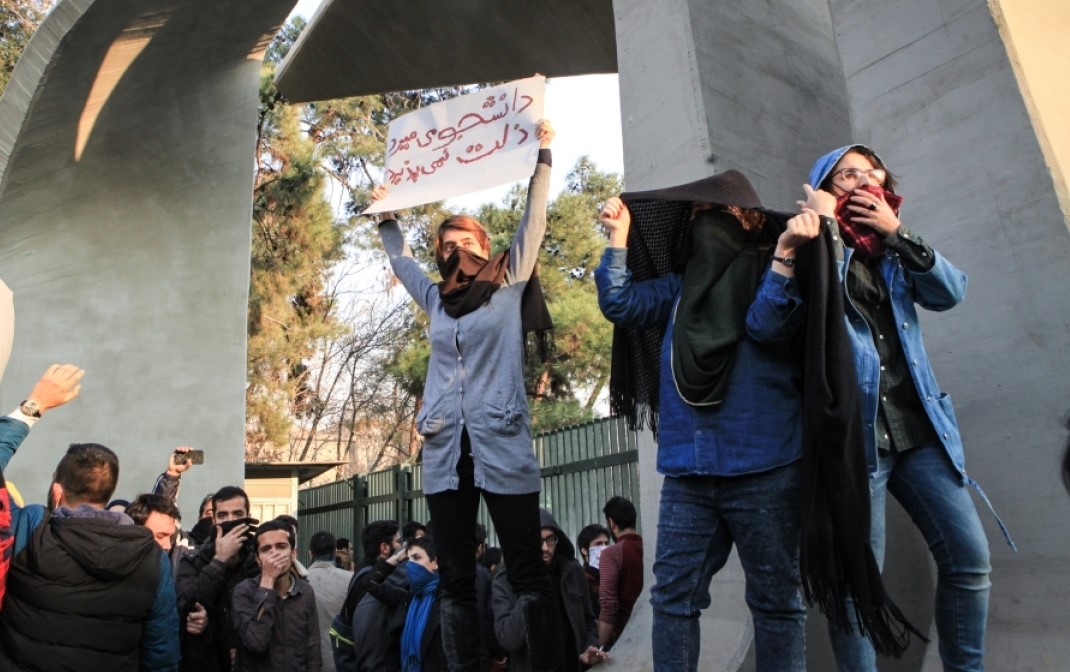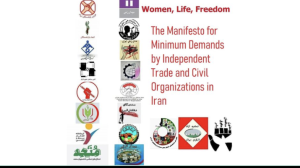Statement of Scholars for the Women-Life-Freedom Revolution in Iran
The Women-Life-Freedom revolution in Iran heralds a new beginning, a beginning to challenge discrimination and move toward equality. A beginning to condemn death and embrace life. An uprising of those who reject authoritarianism and celebrate freedom and democracy.
In this historical moment, we[1] see the solidarity of revolutionary forces around modern political and legal standards as an inevitable necessity. The following statement is an attempt for greater convergence and the realization of peaceful coexistence within a new political framework for Iran after the transition from the unreformable regime of the Islamic Republic. We call on all freedom-seekers and supporters of democracy and equality to collaborate in creating a new beginning that adheres to contemporary political and legal standards, as follows[2]:
- Commitment to the equality of human beings, irrespective of gender, language, belief, religion, skin color, ethnicity, nationality, disability, status, or wealth under the law.
- Protecting human dignity by preventing humiliation, objectification, degradation, and dehumanization[3].
- Adhering to the articles of the International Bill of Human Rights[4] and the Core International Human Rights Instruments of the United Nations[5].
- Adhering to the articles of the Convention on the Elimination of All Forms of Discrimination against Women[6].
- Eliminating all discriminatory laws against women, including laws related to divorce, inheritance, testimony, travel, abortion, etc., and implementing policies that provide affirmative action (e.g., introducing gender quotas[7]) to promote their active participation and advancement in cultural, economic, and political leadership positions.
- Commitment to prohibiting discrimination and protecting the rights of the LGBTQIA+ community[8].
- Commitment to the right to life and protection against torture and other inhumane forms of punishment.
- Commitment to the 17 Sustainable Development Goals set by the United Nations[9], including inclusive and equitable quality education (UNESCO Education 2030 initiative[10]), equality, human rights, justice, health, welfare, economic development, clean energy development, action on global warming, sustainable environmental management, access to clean water, and global cooperation for sustainable development.
- Commitment to the preservation of natural ecosystems and controlling natural resources.
- Cultural pluralism: embracing and respecting cultural diversity by halting policies of denial and assimilation, including ethnocide and linguicide.
- Commitment to the provisions of the United Nations Declaration on the Rights of Indigenous Peoples[11].
- Recognition of Iran as a multinational state[12].
- Formal acceptance, respect, and promotion of native languages[13], including the right to education in one’s first language[14] and support for multilingual structures.
- Rejecting exclusive nationalism and emphasis on civil society and citizen rights.
- Political pluralism: Establishing mechanisms to ensure free competition of different political ideologies and tolerance towards them.
- Emphasis on evidence-based policymaking[15].
- Ensuring that the government does not interfere with people’s beliefs and separating religion from government institutions (secularism).
- Belief pluralism: opposition to the endorsement of any state religion and commitment to religious and non-religious freedoms.
- Opposition to any undemocratic privileges such as prerogative powers.
- Commitment to the right of the people to determine their political, economic, social, and cultural destiny[16].
- Commitment to the separation of powers (legislative, executive, judicial) and transition[17] to a decentralized federal republic[18], necessary to institutionalize democracy in a populous country with a high cultural diversity index[19].
- Rejection of centralist, security-oriented, and ideology-driven policies as the main obstacles in the way of balanced political, economic, and educational development of the country and taking necessary measures to compensate for the losses of regions such as Balochistan, Kurdistan, Luristan, Azerbaijan, Ahvaz, etc.
- Emphasis on justice and establishing independent courts with international oversight for central government crimes.
Jin Jiyan Azadî | Women Life Freedom
Published: 17.02.2023
[1] This project is initiated by a group of Kurdish scholars.
[2] Overlap of the provisions is only meant for more emphasis.
[3] Kaufmann, Paulus, et al., eds. Humiliation, degradation, dehumanization: human dignity violated. Vol. 24. Springer Science & Business Media, 2010.
[4] International Bill of Human Rights, The United Nations, accessed 01 Feb. 2023, <https://www.ohchr.org/en/what-are-human-rights/international-bill-human-rights>.
[5] The Core International Human Rights Instruments, The United Nations, accessed 01 Feb. 2023, <https://www.ohchr.org/en/core-international-human-rights-instruments-and-their-monitoring-bodies>.
[6] Convention on the Elimination of All Forms of Discrimination against Women, The United Nations, accessed 01 Feb. 2023, <https://www.ohchr.org/sites/default/files/Documents/ProfessionalInterest/cedaw.pdf>.
[7] Pande, Rohini; Ford, Deanna. 2012. Gender Quotas and Female Leadership. © World Bank. <https://openknowledge.worldbank.org/handle/10986/9120>.
[8] Born Free and Equal, The United Nations, accessed 01 Feb. 2023, <https://www.ohchr.org/en/publications/special-issue-publications/born-free-and-equal-sexual-orientation-gender-identity-and>.
[9] The Sustainable Development Goals, The United Nations, accessed 01 Feb. 2023, <https://www.un.org/sustainabledevelopment/sustainable-development-goals/>.
[10] Education 2030, UNESCO, accessed 01 Feb. 2023, <https://unesdoc.unesco.org/ark:/48223/pf0000245656>.
[11] UN Declaration on the Rights of Indigenous Peoples, The United Nations, accessed 01 Feb. 2023, <https://www.ohchr.org/en/indigenous-peoples/un-declaration-rights-indigenous-peoples>.
[12] Dieckhoff, Alain. Nationalism and the multination state (2017).
[13] Declaration on the Rights of Persons Belonging to National or Ethnic, Religious and Linguistic Minorities, The United Nations, accessed 01 Feb. 2023, <https://www.ohchr.org/en/instruments-mechanisms/instruments/declaration-rights-persons-belonging-national-or-ethnic>.
[14] Why mother language-based education is essential, UNESCO, accessed 01 Feb. 2023, <https://www.unesco.org/en/articles/why-mother-language-based-education-essential>.
[15] Davies HT, Nutley SM, editors. What works? Evidence-based policy and practice in public services, Bristol University Press, Policy Press, 2000.
[16] International Covenant on Civil and Political Rights, The United Nations, accessed 01 Feb. 2023, <https://www.ohchr.org/en/instruments-mechanisms/instruments/international-covenant-civil-and-political-rights>
International Covenant on Economic, Social and Cultural Rights, The United Nations, accessed 01 Feb. 2023, <https://www.ohchr.org/en/instruments-mechanisms/instruments/international-covenant-economic-social-and-cultural-rights>
[16] Implementing Federalism, accessed 01 Feb. 2023, <https://www.idea.int/sites/default/files/publications/implementing-federalism.pdf>.
[18] Amoretti, Ugo M., and Nancy Gina Bermeo, editors. Federalism and territorial cleavages. JHU Press, 2004.
He, Baogang, Brian Galligan, and Takashi Inoguchi, editors. Federalism in Asia. Edward Elgar Publishing, 2009.
[19] Colomer JM. Equilibrium institutions: the federal-proportional trade-off. Public Choice. 2014 Mar;158(3):559-76.



